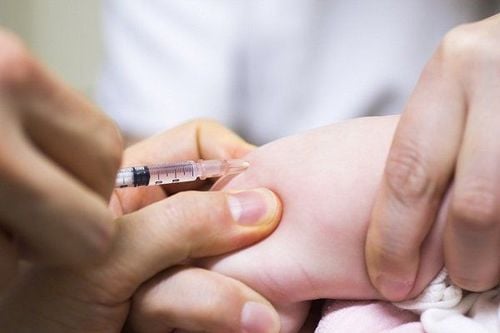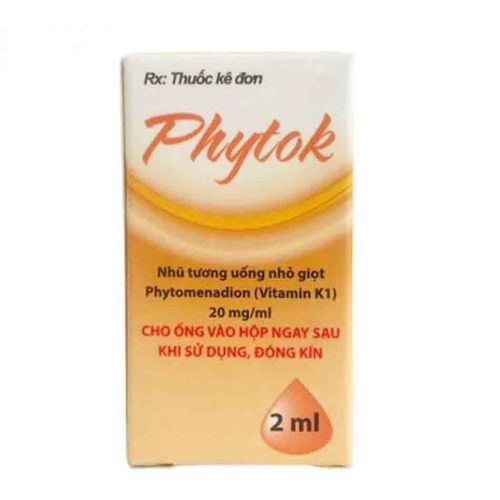This is an automatically translated article.
The article is professionally consulted by Master, Doctor Huynh Bao Toan - Department of Pediatrics - Neonatology - Vinmec Nha Trang International General Hospital.
Newborns who don't get enough vitamin K from their mothers during pregnancy or while breastfeeding are at risk of a rare disorder called vitamin K deficiency haemorrhage (VKDB). VKDB can cause bleeding into the brain and can lead to brain damage or even death. VKDB can be prevented by giving infants extra vitamin K.
1. The role of vitamin K for young children
Vitamin K helps the blood to clot, which is necessary to prevent severe bleeding. Without enough vitamin K, small cuts can bleed for a very long time, and large bruises can result from minor injuries. Bleeding can also occur in other parts of the body, such as the brain (causing a type of stroke).There are 3 types of vitamin K including:
Vitamin K1 also known as phylloquinone found in natural foods; Vitamin K2, also known as enaquinone, is produced by beneficial bacteria in the intestines; Vitamin K3 also known as menadione is a man-made form of vitamin K. Vitamins of group K with the international common name Phytomenadione produced in the form of tablets, sugar coated tablets, ampoules are indicated for use in cases of bleeding and increased risk of bleeding due to hypoprothrombinemia. Normally, bacteria in the intestines can synthesize enough vitamin K, but for newborns, scientists recommend treating babies with a dose of vitamin K1 (Phytomenadione) 1mg right after birth to prevent neonatal bleeding. . By about six months of age, a baby's body has built up its own supply of vitamin K.
Older children and adults get most of their vitamin K from bacteria in their gut, and some from their diets.

With low levels of vitamin K, some babies can bleed very badly - sometimes into the brain, causing significant brain damage. This bleeding is called hemorrhagic disease of the newborn (HDN).
2. Causes of vitamin K deficiency in children
The causes of vitamin K deficiency in young children are due to:Vitamin K is provided from mother to fetus through the placenta, this amount is very small, and the main part of vitamin K that young children receive through breast milk. However, vitamin K in breast milk is also very low. The mother is not fed nutritious food in the last months of pregnancy, in mothers who follow a strict postpartum diet such as abstaining from fat and oil, the amount of vitamin K in breast milk is less. In young children after birth, at one month old, bacteria are not able to synthesize vitamin K in the intestines enough, so young children are more susceptible to vitamin K deficiency leading to brain and meningeal hemorrhage than older children. When the mother takes certain drugs such as anticonvulsants, warfarin or anti-tuberculosis drugs, it can cause typical and early neonatal hemorrhagic disease. Young children who have to take antibiotics early, have digestive disorders also make the source of vitamin K synthesized in the intestine less.
3. Brain hemorrhage in young children due to vitamin K deficiency
According to research, 90% of children with cerebral hemorrhage usually occur at 30-40 days of age, which is caused by vitamin K deficiency.Children with cerebral hemorrhage, meninges have the following clinical symptoms:
Acute ischemic syndrome: blue skin, pale mucous membranes. Cerebral-meningeal syndrome: convulsions, whining, bulging fontanelles, lethargy, coma, hemimotor reduction. Children with cerebral hemorrhage despite intensive treatment, the mortality rate or sequelae is still high (25-40% mortality, 40-50% sequelae). The most common sequelae include: cerebral atrophy, hydrocephalus, microcephaly, epilepsy, cerebral palsy, or psychomotor development defects.

4. Prevention of cerebral hemorrhage in neonates
The injection of vitamin K for newborns is to prevent brain and meningeal hemorrhage in newborns.Accordingly, the Ministry of Health specifically guides:
For children > 1,500 grams: 1mg Vitamin K1 intramuscularly For children ≤ 1,500 grams: 0.5mg Vitamin K1 intramuscular injection Vitamin K1 injections are done right after the child receive EENC care (Early Essential Care for Mothers and Newborns during and immediately after birth/after cesarean section).
5. Where to inject vitamin K for babies after birth?
Parents can inject vitamin K for their babies after birth at public and non-public hospitals across the country. At Vinmec International General Hospital, there is a package of services called "MAYROLOGY PACKAGE", including prenatal care, prenatal care and postpartum care. After birth, the baby will be fully injected with vitamin K. Vitamin K is preserved and stored in the best conditions with modern and advanced facilities, parents can rest assured to trust.With a team of highly qualified and experienced doctors and a system of modern equipment, at the same time, comprehensive professional cooperation with the most prestigious hospitals in Vietnam and developed countries: Singapore, America, Japan... Vinmec International General Hospital is the perfect address for mother and baby health care, so you can rest assured to protect your baby.
Doctor Huynh Bao Toan has 13 years of experience in the field of Pediatrics. Before being a neonatologist at Vinmec Nha Trang International General Hospital, he was the former Head of Pediatrics - Neonatology Department of Vinmec Phu Quoc International General Hospital
Please dial HOTLINE for more information or register for an appointment HERE. Download MyVinmec app to make appointments faster and to manage your bookings easily.
| Đăng ký tư vấn dinh dưỡng cho bé tại: https://i.vinmec.com/dangkytuvandinhduong |
|---|














